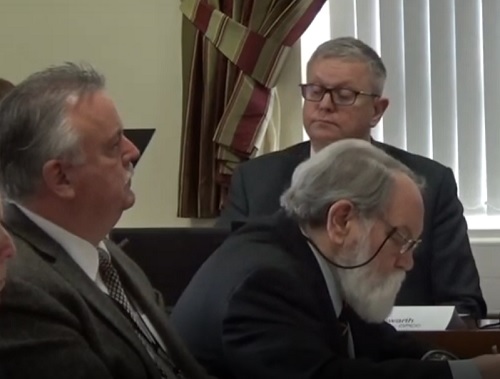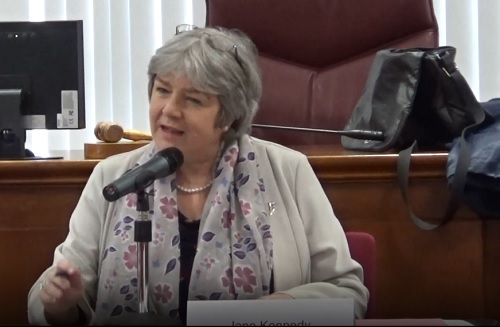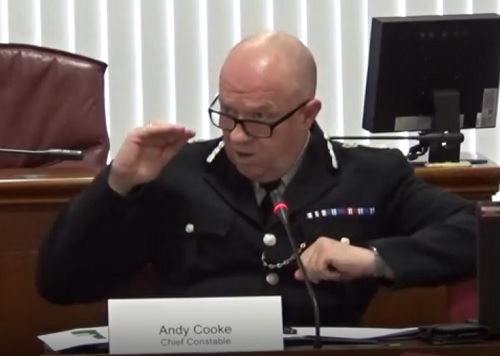Majority of councillors on Merseyside Police and Crime Panel agreed to increase in police element of council tax (Wirral, Liverpool, Sefton, St Helens and Knowsley) from April 2020 as part of outgoing Police and Crime Commissioner Jane Kennedy’s last budget
By John Brace – Local Government Editor
and
Leonora Brace – Justice Correspondent

We were off to Knowsley Council in Huyton for a public meeting of the Merseyside Police and Crime Panel this morning (7th February 2020) when councillors (the two from Wirral were Cllr Adrian Jones (Labour) and Cllr Les Rowlands (Conservative)) (pictured above) decided to increase the police element of council tax from April 2020.
Although the Merseyside Police and Crime Panel is legally required to have at least two co-opted members it doesn’t – but let’s not nit pick on the legalities of whether the decision on the entire Merseyside Police and Office of the Police and Crime Commissioner budget for 2020-2021 was or was not decided legally.
On the way to the public meeting the Northern Rail train arrived ten minutes late at Liverpool Lime Street. At the recent general election – despite Labour’s policy for renationalisation of the train franchises being condemned by the Conservatives during the general election – since then (with regards to Northern Rail) the Conservatives have decided to renationalise Northern Rail (effective from 1st March 2020). From that date control will pass from Arrive Rail North to Northern Trains Limited (an arms length subsidiary of the Department for Transport’s OLR (Operator of Last Resort). Northern Rail (under Arriva Rail North) blame half the delays and cancellations on Network Rail.
On arrival at the municipal buildings in Huyton, strangely at the same time as the Wirral councillors, we went through a locked door, up in a lift and on the walls were notices requesting that Knowsley Council staff aren’t filmed and the existing Knowsley Council filming policy was on a noticeboard outside the Council Chamber, with a literal red carpet on the first floor outside.
Before the meeting councillors had a roughly half hour private briefing, at which the Chair of the Merseyside Police and Crime Panel (Cllr Paul Lynch (St Helens), Labour and Co-operative Party) and councillors on the Merseyside Police and Crime Panel were given written instructions as to what to say and also given written examples of questions (written by senior Knowsley Council managers) to ask during the meeting.

The meeting itself (which I filmed the item for about the council tax setting) saw the outgoing Police and Crime Commissioner Jane Kennedy (pictured above who stated on tape she won’t be standing when her term of office ends in May 2020) read out a written statement about her proposed budget for 2020-2021.
When reaching the section in her written statement about extra police officer recruitment (which was also a general election issue) she accidentally and rather surprisingly announced that her budget would lead to 2,000 extra police officers – which caused looks of mild panic on the senior police officer to her right (Chief Constable) and her staff to the left as the real figure was 200. She blamed this on not wearing her glasses (which were on her head).
It then got even more rather confusing as it turned out the plan in the budget was to recruit 500 by the end of the 2020-21 period.
The impact of the proposed budget to increase council tax and the consultation Jane Kennedy ran before the meeting was discussed – at least one councillor did ask whether asking around 1,700 people meant their views were considered representative of a Merseyside population (which at the last estimate is around 1.6 million)? Jane Kennedy responded in her answer with what happened in another area (Lancashire) and that she saw doing for example formal telephone surveys (weighted by a number of demographic factors) as expensive compared to asking people coming in and out of supermarkets on Merseyside.

At least one question directed towards the Chief Constable Andy Cooke (pictured above) about policing he refused to answer on the basis that in his view it was political. There’s a long standing view that it’s better not to have political interference in matters in which the police have operational independence and indeed police officers are required not to take an active part in politics as they are required to be impartial.
However after a lot of discussion about issues such as whether people could afford to pay more council tax, whether they wanted to pay more council tax and the history of policing on Merseyside going back to 2008, all but two dissenting councillors (Cllr Simon Shaw (Liberal Democrat (Sefton Council) and Cllr Michelle Sweeney (Labour (St Helens)) voted to endorse the precept outright.
These latter two councillors voted to endorse but with unspecified additional recommendations (but were outvoted by the others).
Both the Wirral Council councillors (Cllr Adrian Jones (Labour) and Cllr Les Rowlands (Conservative)) voted in favour of the budget proposals.
The impact on council tax will lead to a rise in the police element of those who pay council tax in the local authority areas of Wirral, Liverpool, Sefton, St Helens and Knowsley. The impact for each council tax band is outlined below (these are amounts over the whole year of 2020-21 although it’s possible amounts could be a few pennies different from the below due to rounding problems as these figures weren’t included in the papers).
Council tax band – police element (2020-21) – increase
These figures impact people in Wirral, Liverpool, Sefton, St Helens and Knowsley.
Band A – £141.31 (+£6.67)
Band B – £165.16 (+£7.77)
Band C – £187.91 (+£8.88)
Band D – £211.97 (+£10)
Band E – £259.07 (+£12.22)
Band F – £306.17 (+£14.44)
Band G – £353.28 (+£16.66)
Band H – £423.94 (+£20.00)
If you click on any of the buttons below, you’ll be doing me a favour by sharing this article with other people.
So when the government said it was giving more money to the police, it meant council tax was going up?
I for one can’t afford to pay more council tax!
Thanks for your question.
Just to be fair below is the answer when a Labour MP asked a very similar question to the Conservative Prime Minister on Wednesday (which may leave you none the wiser). There is a longer and more nuanced answer I could give, but it would be rather dull and boring involving what is termed Operation Uplift (the extra funding from national government) and involves how much of the extra (now agreed) 500 police officers on Merseyside will be funded by this (by the way extra police staff – estimated at 166 to support those officers has to happen too)!
Matt Western (Warwick and Leamington) (Labour)
Q3. In the past 10 years, violent crime has risen 152% across the towns of Warwickshire. In the past two weeks in my constituency, two people have been killed in two separate events and others remain seriously ill or injured. The Government have promised to reinstate 20,000 police officers, but is not the simple truth that it is now our residents, through hikes in council tax of 12% last year and 6% this year, who are picking up the whole bill for the Old Bill, and that the Conservative party is no longer the party of law and order but the party of fear and disorder?
The Prime Minister
To be fair to the hon. Gentleman, he is making an important point about violent crime. I share his anger. That is why we are putting 20,000 more police on the streets. That is, above all, why we are now tackling the county lines drugs gangs that are behind so much of the rise in violent crime. We will get that crime down.